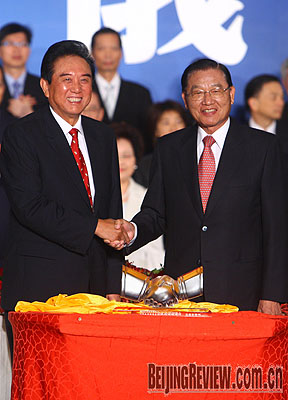|

CONSENSUS BUILT: Chen Yunlin (left) and Chiang Pin-kung shake hands after signing four agreements on cross-straits exchanges in Taipei on November 4
On November 3-7, Chen Yunlin, President of the mainland's Association for Relations Across the Taiwan Straits (ARATS) paid a five-day visit to Taiwan. He had talks with Chiang Pin-kung, Chairman of the Straits Exchange Foundation (SEF), in Taipei and met with several senior politicians in the island. The ARATS and SEF also signed four agreements on direct shipping, air and postal services across the Taiwan Straits and food safety cooperation.
Founded in 1991 and 1990 respectively, ARATS and SEF are authorized by the mainland and Taiwan to handle cross-Taiwan Straits exchanges.
Chen's ice-breaking journey was a milestone in mainland-Taiwan relations, marking the formal establishment of a regular negotiation channel across the Taiwan Straits.
Fruit of joint efforts
Since April 2005, the mainland has been making great efforts to consolidate the mechanism for cross-straits party exchanges and has issued a series of policies benefiting Taiwan people, creating conditions favorable for restoring talks between the ARATS and SEF. After Kuomintang's Ma Ying-jeou became Taiwan authorities' leader, he carried out a cross-straits policy based on the "one country, two regions" framework, which aims at peace and common prosperity on both sides of the Taiwan Straits. Taiwan authorities also actively prepared for the resumption of negotiations between the ARATS and SEF on the basis of the "1992 Consensus" on the one-China principle.
In June, the top-level contact between the ARATS and SEF was resumed after a halt of nearly 10 years. Two important agreements were signed at the first meeting between Chen and Chiang.
Despite the disruption from Taiwan's opposition Democratic Progressive Party and Taiwan's former leader Chen Shui-bian and his followers, the second Chen-Chiang meeting was held in Taipei as scheduled, showing the common desire of leaders in the mainland and Taiwan to overcome challenges, promote peaceful development and realize national prosperity with joint efforts. It also reflects a spirit shared by both sides of "practical cooperation, mutual trust and mutual understanding, and putting people's and national interests first."
New impetus
After their establishment in the early 1990s, the interactions between the ARATS and SEF were not always smooth. In April 1993, the first highest-level meeting between the two organizations, participated by then ARATS President Wang Daohan and SEF Chairman Koo Chen-fu, was held in Singapore. Koo visited the mainland to meet Wang in Shanghai in 1998. Due to then Taiwan leader Lee Teng-hui's declaration of his "two states" theory on mainland-Taiwan relations in July 1999, the planned meeting between Wang and Koo in Taipei was canceled and negotiations between the ARATS and SEF were suspended until the first Chen-Chiang meeting in June.
As the mainland's highest-ranking authorized negotiator for cross-straits exchanges, Chen's landing in Taiwan and his meeting with Chiang in Taipei ushered in a new era when two-way exchanges between top leaders of the ARATS and SEF become a reality. Wang Yi, Director of the Taiwan Affairs Office of the State Council, highly appreciated Chen's Taiwan visit as a new starting point for regular negotiations between the ARATS and SEF.
Apart from the four agreements signed in the second Chen-Chiang meeting, the negotiation theme for the third meeting between the two leaders and nine major topics for discussion between the ARATS and SEF were also fixed during Chen's Taiwan visit. Chen formally invited Chiang to visit the mainland for their third meeting in the first half of 2009, suggesting that, since great achievements had been made in direct transportation links, future negotiations should focus on cross-straits financial cooperation and the normalization of cross-straits economic relations, so as to gradually set up an institutionalized framework for cross-straits economic cooperation. The ARATS and SEF also held two special seminars on cross-straits financial cooperation in Taipei, with a view to jointly overcoming the global financial turmoil. This was the first time that high-ranking financial officials from the mainland and Taiwan held face-to-face talks on cooperation.
Direct links
As a result of the agreements on weekend charter flight service and direct air and shipping services that were signed by Chen and Chiang in June and November, respectively, cross-straits direct transportation is already true. Given the current global economic recession, direct air and shipping services across the Taiwan Straits may not have an instant impact on Taiwan's economic recovery, but it is helpful in the long run.
| 